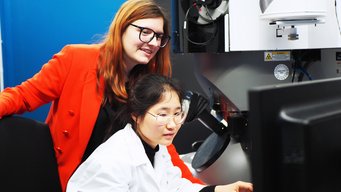Advancing green technologies
Lilian Vogl is heading a new research group on Environmental and Analytical Electron Microscopy

Dr. Lilian Vogl is leading the newly established Environmental & Analytical Electron Microscopy Group at the Max Planck Institute for Sustainable Materials. Her team focuses on advancing materials for green technologies by replacing rare-earth elements, improving durability, and enhancing efficiency in applications such as photocatalysis, solar cells, batteries, and energy-efficient computing. As example, they are exploring the growth of iron oxides as catalysts for water splitting, a promising avenue for clean hydrogen production.
“While a lot of attention goes into decreasing CO2 emissions through new carbon-free technologies, my research group will also focus on ways to store the already existing CO2. Therefore, we will study metal-organic structures and crystals that capture and retain carbon emissions”, says Vogl. Her team uses environmental transmission electron microscopes to observe how materials interact with different gas atmospheres paving the way for novel energy-related applications.
Beyond her scientific mission, Vogl says: “I’m really emphasising the importance of a collaborative and inclusive research culture. Every team member's perspective is valued. And I’m very soon also offering new research positions – so stay tuned.”
Before joining MPI-SusMat in November 2024, Vogl was a postdoctoral researcher at the National Center for Electron Microscopy in Berkeley (USA) and at the Swiss Federal Laboratory of Materials Science and Technology in Thun. She completed her PhD with distinction in 2021 at the Friedrich-Alexander University Erlangen-Nürnberg (Germany) on functional nanowires studied with correlative in-situ light and electron microscopy.
